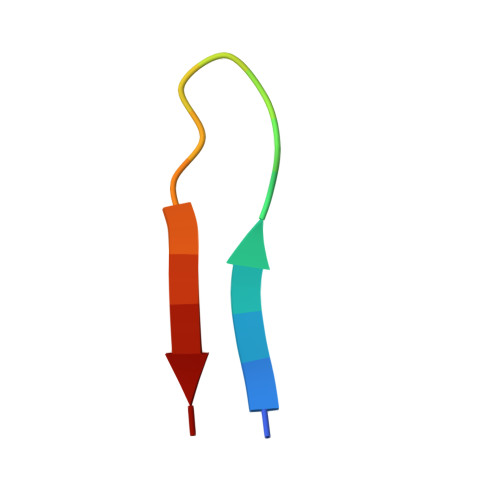Induced fit in HIV-neutralizing antibody complexes: evidence for alternative conformations of the gp120 V3 loop and the molecular basis for broad neutralization.
Rosen, O., Chill, J., Sharon, M., Kessler, N., Mester, B., Zolla-Pazner, S., Anglister, J.(2005) Biochemistry 44: 7250-7258
- PubMed: 15882063
- DOI: https://doi.org/10.1021/bi047387t
- Primary Citation of Related Structures:
1U6U, 1U6V - PubMed Abstract:
Human monoclonal antibody (mAb) 447-52D neutralizes a broad spectrum of HIV-1 isolates, whereas murine mAb 0.5beta, raised against gp120 of the X4 isolate HIV-1(IIIB), neutralizes this strain specifically. Two distinct gp120 V3 peptides, V3(MN) and V3(IIIB), adopt alternative beta-hairpin conformations when bound to 447-52D and 0.5beta, respectively, suggesting that the alternative conformations of this loop play a key role in determining the coreceptor specificity of HIV-1. To test this hypothesis and to better understand the molecular basis underlying an antibody's breadth of neutralization, the solution structure of the V3(IIIB) peptide bound to 447-52D was determined by NMR. V3(IIIB) and V3(MN) peptides bound to 447-52D exhibited the same N-terminal strand conformation, while the V3(IIIB) peptide revealed alternative N-terminal conformations when bound to 447-52D and 0.5beta. Comparison of the three known V3 structures leads to a model in which a 180 degrees change in the orientation of the side chains and the resulting one-residue shift in hydrogen bonding patterns in the N-terminal strand of the beta-hairpins markedly alter the topology of the surface that interacts with antibodies and that can potentially interact with the HIV-1 coreceptors. Predominant interactions of 447-52D with three conserved residues of the N-terminal side of the V3 loop, K312, I314, and I316, can account for its broad cross reactivity, whereas the predominant interactions of 0.5beta with variable residues underlie its strain specificity.
- Department of Structural Biology, Weizmann Institute of Science, Rehovot 76100, Israel.
Organizational Affiliation:















